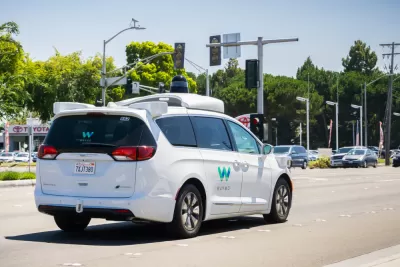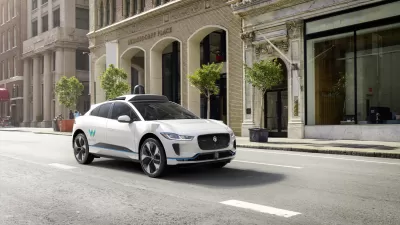There are a lot of players in the autonomous vehicle game. It can be hard to keep track of which company is fighting for which share of the market, and which companies are out in front in the race to dominate the emerging industry.

"In the race to start the world’s first driving business without human drivers, everyone is chasing Alphabet Inc.’s Waymo."
That's the provocative opening pronouncement in a big, feature-length article by David Welch and Elisabeth Behrmann.
"The Google sibling has cleared the way to beat its nearest rivals, General Motors Co. and a couple of other players, by at least a year to introduce driverless cars to the public," add Welch and Behrmann.
Still, the article acknowledges that "[t]he road to autonomy is long and exceedingly complicated," and there will be a plenty of surprising developments along the way. Experts quoted in the article, like Brian Collie, head of Boston Consulting Group’s U.S. automotive practice, expect there to be only a few winners when the competition is over. To the victors go the spoils: "Goldman Sachs Group Inc. predicts that robo-taxis will help the ride-hailing and -sharing business grow from $5 billion in revenue today to $285 billion by 2030," write Welch and Behrmann.
After introducing the playing field, and leading theories about how and when autonomous vehicles will take over the roads, the article breaks down a survey of the emerging industry into categories: 1) The clear Leaders, 2) Staying Close, 3) Following the Pack, and 4) Unusual Cases and Dark Horses.
FULL STORY: Who’s Winning the Self-Driving Car Race?

Alabama: Trump Terminates Settlements for Black Communities Harmed By Raw Sewage
Trump deemed the landmark civil rights agreement “illegal DEI and environmental justice policy.”

Planetizen Federal Action Tracker
A weekly monitor of how Trump’s orders and actions are impacting planners and planning in America.

The 120 Year Old Tiny Home Villages That Sheltered San Francisco’s Earthquake Refugees
More than a century ago, San Francisco mobilized to house thousands of residents displaced by the 1906 earthquake. Could their strategy offer a model for the present?

In Both Crashes and Crime, Public Transportation is Far Safer than Driving
Contrary to popular assumptions, public transportation has far lower crash and crime rates than automobile travel. For safer communities, improve and encourage transit travel.

Report: Zoning Reforms Should Complement Nashville’s Ambitious Transit Plan
Without reform, restrictive zoning codes will limit the impact of the city’s planned transit expansion and could exclude some of the residents who depend on transit the most.

Judge Orders Release of Frozen IRA, IIJA Funding
The decision is a victory for environmental groups who charged that freezing funds for critical infrastructure and disaster response programs caused “real and irreparable harm” to communities.
Urban Design for Planners 1: Software Tools
This six-course series explores essential urban design concepts using open source software and equips planners with the tools they need to participate fully in the urban design process.
Planning for Universal Design
Learn the tools for implementing Universal Design in planning regulations.
Clanton & Associates, Inc.
Jessamine County Fiscal Court
Institute for Housing and Urban Development Studies (IHS)
City of Grandview
Harvard GSD Executive Education
Toledo-Lucas County Plan Commissions
Salt Lake City
NYU Wagner Graduate School of Public Service





























